EMDR Integrative Group Treatment Protocol (EMDR-IGTP) Adapted for Ongoing Traumatic Stress and EMDR Protocol for Recent Critical Incidents and Ongoing Traumatic Stress (EMDR-PRECI)
Presented by Ignacio Jarero, PhD, EdD
Thursday, April 19, 2018 · 9:00 am to 5:15pm
Note: Training only offered at the conference site in Natick, MA
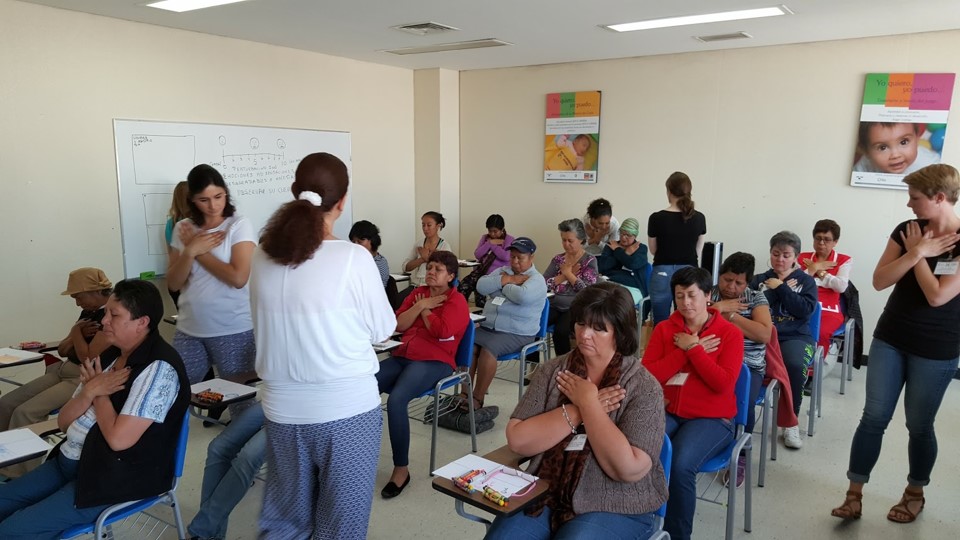
EMDR Early Intervention has a natural place in the disaster mental health continuum-of-care context and may be key after everyday life traumatic events as a brief treatment modality. Use of early EMDR therapy can result in the adaptive processing of trauma memories, the prevention of the accumulation of negative associated links, and the reduction of suffering and later complications. Thus, it promotes mental health and resilience, especially during ongoing traumatic stress. This workshop will focus on integrating into clinical practice two EMDR therapy protocols specially designed for early intervention and ongoing traumatic stress that are part of the United Nations Institute for Training and Research (UNITAR) course for Peace Operations Personnel and Humanitarian Aid Workers. Within the context of Psycho-Oncology this protocol addresses one of the major psychological dimension of cancer: the ongoing cancer-related stress responses with trauma-related disorders.
The EMDR Integrative Group Treatment Protocol (EMDR-IGTP) provides individual EMDR therapy in a group setting, ensuring that many individuals can be treated simultaneously. Small or large groups can be made up of patients who have been through the same type of trauma (e.g. sexual abuse, severe interpersonal violence), experience (e.g. disaster, refugees, shooting, terrorist attacks), or diverse trauma histories with unifying circumstance (e.g. severe or chronic illness, domestic violence) in common. The effectiveness of this protocol has been documented around the world for large and small groups of adult, adolescent and child participants, with multiple case reports, field studies, randomized controlled trials and one meta-analysis.
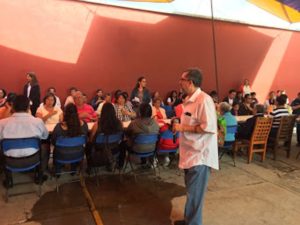
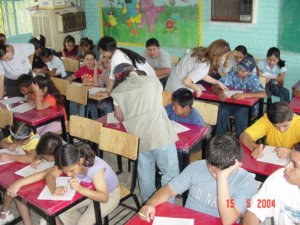
The EMDR Protocol for Recent Critical Incidents and Ongoing Traumatic Stress (EMDR-PRECI) was developed in the field to treat critical incidents that were related to stressful events that continued for an extended period and where there is not a post-trauma safety period for memory consolidation. There is evidence supporting the efficacy of this protocol in reducing symptoms of posttraumatic stress in adults and maintaining those effects despite ongoing threat and danger in a disaster mental health continuum of post-incident care context, as an early intervention for traumatized first responders working after a human massacre, and as an early intervention for technological disaster survivors. It appears that EMDR-PRECI helped to prevent the development of chronic PTSD and to increase psychological and emotional resilience.
Objectives – Participants will be able to:
- Participate in a simulation rehearsal to have a firsthand and practical experience of the EMDR-IGTP Adapted for Ongoing Traumatic Stress (EMDR-IGTP-OTS)
- Learn about the EMDR-IGTP-OTS background
- Understand how the adaptation to treat population living with ongoing traumatic stress changes the traditional way that the targeted memory is selected to allow for the identification, targeting and processing of the continuum of multiple traumatic experiences faced by this population and not only one target per session
- Learn about the EMDR-IGTP-OTS differences with traditional group therapy and with group trauma-focused Cognitive Behavioral Therapy
- Know the EMDR-IGTP-OTS Objectives, Advantages and Effectiveness
- Learn about Early EMDR Therapy Intervention
- Understand and learn the EMDR-IGTP-OTS 8 Phases rationale
- Learn about the EMDR-PRECI background and the Acute Trauma and Ongoing Traumatic Stress theoretical conceptualization based on the AIP model that expands the horizon of the EMDR-based early interventions for individuals and groups
- Learn about the EMDR-PRECI benefits and research evidence
- Understand and learn the EMDR-PRECI 8 Phases rationale
Schedule:
-
- 8:00am Registration
- 9:00 EMDR-IGTP
- 10:30 Break
- 10:45 Q&A about the EMDR-IGTP experience
- 11:00 EMDR-IGTP and the 8 Phases
- 12:15pm Lunch
- 1:30 EMDR-PRECI simulation demonstration
- 2:15 Q&A about the EMDR-PRECI demonstration
- 2:30 EMDR-PRECI Background and Phase 1 (Client History) and Phase 2 (Preparation)
- 3:00 Break
- 3:15 EMDR-PRECI Phase 3 (Assessment), Phase 4 (Desensitization and Reprocessing Sequence), and Phase 5 (Global Installation Phase)
- 4:00 EMDR-PRECI Phase 6 (Body Scan), Phase 7 (Closure), Three-Pronged Approach (past memories, present triggers, future template and post-traumatic grow)
- 5:15 Conclusion
Ignacio (Nacho) Jarero, Ph.D, Ed.D, who specializes in Humanitarian Trauma Recovery and Research Programs on EMDR therapy, has conducted seminars and workshops around the world with participa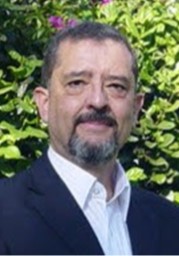 nts of 65 different countries. Since 1998, he has provided field services in Latin America, the Caribbean, Spain and South Asia to natural or human-provoked disaster victims, family members of those deceased, and first responders. Dr. Jarero is an EMDR Institute & EMDR-Iberoamerica Senior Trainer of Trainers and Specialty Trainer for Latin America & the Caribbean and has received the EMDR-Iberoamerica Francine Shapiro Award, the EMDRIA’s Outstanding Research Award, the International Critical Incident Stress Foundation International Crisis Response Leadership Award, the EMDR Colombia Jaibaná Award for Humanitarian Work, and the Argentinean Society of Psychotrauma (ISTSS Affiliate) Psychotrauma Trajectory Award. He is co-author of the EMDR Protocol for Recent Critical Incidents and Ongoing Traumatic Stress© (EMDR-PRECI), the EMDR Individual Protocol for Paraprofessionals use in Acute Trauma Situations (EMDR-PROPARA) and the EMDR Integrative Group Treatment Protocol© (EMDR-IGTP) that has been applied worldwide with natural or human provoked disaster survivors. He is the author of the Training Program for Paraprofessionals as EMDR Clinicians Assistants for Advance Psychosocial Interventions. Dr. Jarero is EMDR Mexico Co-Founder, Latin American & Caribbean Foundation for Psychological Trauma Research (Francine Shapiro Award Winner), Founder & President, International Center of Psychotraumatology, Founder & President, Iberoamerican Journal of Psychotraumatology and Dissociation, Co-Founder & Editor in Chief, and the Mexican Association for Mental Health Support in Crisis (AMAMECRISIS, NGO), Founder & President. Download PDF for full event details.
nts of 65 different countries. Since 1998, he has provided field services in Latin America, the Caribbean, Spain and South Asia to natural or human-provoked disaster victims, family members of those deceased, and first responders. Dr. Jarero is an EMDR Institute & EMDR-Iberoamerica Senior Trainer of Trainers and Specialty Trainer for Latin America & the Caribbean and has received the EMDR-Iberoamerica Francine Shapiro Award, the EMDRIA’s Outstanding Research Award, the International Critical Incident Stress Foundation International Crisis Response Leadership Award, the EMDR Colombia Jaibaná Award for Humanitarian Work, and the Argentinean Society of Psychotrauma (ISTSS Affiliate) Psychotrauma Trajectory Award. He is co-author of the EMDR Protocol for Recent Critical Incidents and Ongoing Traumatic Stress© (EMDR-PRECI), the EMDR Individual Protocol for Paraprofessionals use in Acute Trauma Situations (EMDR-PROPARA) and the EMDR Integrative Group Treatment Protocol© (EMDR-IGTP) that has been applied worldwide with natural or human provoked disaster survivors. He is the author of the Training Program for Paraprofessionals as EMDR Clinicians Assistants for Advance Psychosocial Interventions. Dr. Jarero is EMDR Mexico Co-Founder, Latin American & Caribbean Foundation for Psychological Trauma Research (Francine Shapiro Award Winner), Founder & President, International Center of Psychotraumatology, Founder & President, Iberoamerican Journal of Psychotraumatology and Dissociation, Co-Founder & Editor in Chief, and the Mexican Association for Mental Health Support in Crisis (AMAMECRISIS, NGO), Founder & President. Download PDF for full event details.
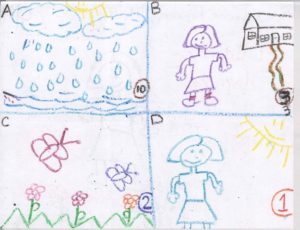
Thursday, April 19, 2018 · 9:00 am to 5:15pm
The Verve, Crowne Plaza Boston-Natick
1360 Worcester Street
Natick, MA 01760
Sponsored by EMDR Advanced Training & Distance Learning 7 credits: EMDRIA, APA, NBCC approved masters level (LCSW, LMFT, LMHC, LPC)